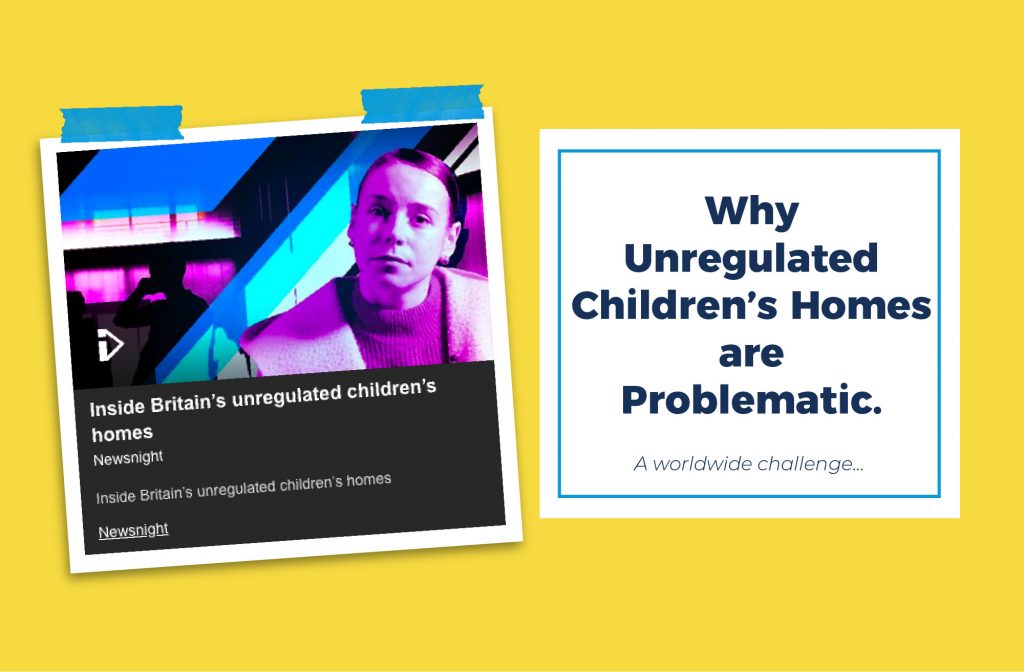"You don’t have a safe place and not having a safe place is like being lost.”
Recently, I watched this news item about unregulated children’s homes in the UK.
Unregulated homes are a global problem. Unregulated means there is no clear minimum standards or national inspection framework or license system. Homes can operate as they wish. This can also apply outside children’s homes to unregulated foster care, kinship care or reunification programmes.
Regulation means having minimum standards, inspections and reviews are important to ensure children receive safe and positive care experiences. Inspections involve mandatory checks to determine whether an organisation is meeting minimum standards. A review, on the other hand, is requested by an organisation to help flag any concerns, highlight successes and explore ways their practise can be improved. It might seem like red tape but it's important.
Klaudia, a young person interviewed in the programme, powerfully describes the reason why the red tape worth it:
“{The worst thing was no} safety and stability. You don’t have a home. You have somewhere you are staying. You don’t have a safe place and not having a safe place is like being lost.”
Paige (a young person) said ‘loneliness’ is a big problem for children living outside parental care. She described how important it is for ‘staff’ (carers and social workers) to ‘care’, ‘to be present – have conversations, spend time with the young person or, in other words, to be a ‘parent’ rather than a staff member doing the bare minimum just to keep their job and get paid.
What was clear from them both was the need for QUALITY care. They felt unsafe or that they did not belong with a family or important person.
Safety + Belonging = Thriving.
These elements were not present for Klaudia and Paige.
It is positive the government in the UK is committing to changing this and bringing in standards and regulation. There were a number of examples that illustrated the need for regular inspections and reviews:
- The fact that one support worker in a home was a convicted drugs supplier working with vulnerable young people. Vulnerable youth are especially at risk being exploited and recruited to join drug gangs, or become involved in drug trading.
- The lack of clear assessments to consider what was a safe mix of young people in the home.
- The lack of staff training can make the situation worse. I know from my own experience working in a children’s home before I became a social worker. I had no training so I had to react from my own instincts and thoughts, rather than knowledge and skills I had been supported to learn and implement. I also know that when we all started to receive training the quality of care improved. We started to provide quality care for the children we worked with, children who, due to some very challenging life experiences, had quite complex needs.
Klaudia later talked about her current situation living at university. Her body language and expressions changed completely at this point. She smiled. She relaxed. She moved closer to the TV camera and was enthusiastic. It was clear that at university, she felt safer and like she had somewhere to belong. She talked about being part of her community. She appeared to be thriving.
The programme clearly demonstrated that wherever a child/young person lives we need to ensure they are both protected and experiencing quality care. To do this we need to have clear standards and expectations including inspections to ensure those standards are being upheld , that staff are appropriately equipped for their roles, and services regularly reviewed to identify areas for improvement. Every country and every organisation providing care needs to have regulatory systems in place that incorporate these components.
SFAC equips and empowers organisations and governments to set up and implement such systems. We can provide independent reviews where required so organisations can say with confidence whether or not the care they are providing is of good quality and truly protects children.
No organisation, government or otherwise, should ever stop learning and improving. We all need to be open to this type of review and reflection to ensure every child grows up in a place where they can be and feel safe and where they feel a sense of belonging. It is this foundation that will give them the opportunity to thrive.

